Overview
In-home caregiving services are essential for providing support to seniors and individuals with chronic conditions. These services enhance quality of life by offering personalized assistance tailored to unique needs. Imagine the comfort of receiving care in your own home, where you can maintain your independence while enjoying compassionate support.
Not only do these services improve physical health outcomes, such as mobility and independence, but they also play a crucial role in addressing emotional well-being. By reducing feelings of isolation, caregivers ensure that clients feel valued and connected. This holistic approach to care nurtures both body and spirit, allowing individuals to thrive in their familiar surroundings.
We’re here for you, and your comfort is our priority. If you or a loved one is seeking compassionate care that truly understands and addresses your needs, consider reaching out to learn more about how in-home caregiving can make a difference in your life.
Introduction
In-home caregiving is at the heart of a transformative approach to healthcare, offering essential support tailored to individuals in the comfort of their own homes. This model addresses not only the physical needs of seniors, those with chronic illnesses, and individuals recuperating from surgery but also highlights the importance of emotional well-being and companionship. As families navigate the complexities of caregiving, it’s crucial to understand the diverse services available—from personal care to skilled nursing.
With the rising demand for personalized care solutions and the integration of innovative technologies, the landscape of in-home caregiving is evolving rapidly. This article explores the many facets of in-home care, including its benefits, funding options, and the emotional impact on both caregivers and families. We’ll also highlight the pivotal role of organizations like Best Care Nurses Registry in enhancing the quality of life for those they serve. Remember, your comfort is our priority, and we’re here for you every step of the way.
Understanding In-Home Caregiving: What It Is and Who It Serves
In-home caregiving services encompass a variety of options designed to assist individuals within their own homes, focusing on daily tasks and medical needs. This approach is particularly beneficial for seniors, those with chronic illnesses, and individuals recovering from surgery. Support can come from family members, professional assistants, and licensed nurses, all playing a crucial role in ensuring the comfort and safety of those receiving assistance.
At Best Care Nurses Registry, we recognize the vital contributions of Certified Nursing Assistants (CNA) and Home Health Aides (HHA) in enhancing the health and quality of life for seniors. Our personalized home health support services are tailored to meet the unique needs of each individual, ensuring they receive compassionate assistance that resonates with their specific situation. Our process begins with a simple call to discuss your needs, followed by collaboration with your healthcare provider to create a treatment plan that perfectly suits your requirements.
We then introduce you to compassionate caregivers from whom you can choose, fostering a comfortable and trusting relationship.
Call (888) 203-2529 to schedule a conversation and discuss your needs today.
The impact of in-home caregiving services on the quality of life for elderly individuals is profound. Studies indicate that 87.3% of home health episodes between 2019 and 2024 resulted in improved mobility for patients, as highlighted in the case study titled “Patient Outcomes in Home Health Care.” This underscores the effectiveness of these services in enhancing physical capabilities.
Furthermore, with one in three adults aged 50-80 reporting feelings of isolation, the emotional support provided by caregivers becomes essential. In fact, 5% of this demographic often experiences loneliness, emphasizing the need for companionship and social interaction that in-home care can provide.
The benefits of in-home caregiving services extend beyond physical assistance. For seniors, these services promote independence, enabling them to remain in familiar surroundings while receiving the necessary support. This not only enhances their overall well-being but also alleviates the emotional burden on family members, who can focus on their personal lives, reassured that their loved ones are well cared for.
Best Care Nurses Registry offers flexible assistance options, including 24-hour support, to ensure that your loved ones receive the help they need when it matters most. We also provide guidance with payment options and long-term insurance claims to simplify the process for families. Recent forecasts suggest a growing demand for home health assistants, with an expected need for 924,000 personal support aides and home health aides from 2021 to 2031.
This trend reflects the increasing recognition of the importance of at-home support. Additionally, expert opinions consistently affirm the advantages of in-home caregiving, underscoring its role in improving patient outcomes and satisfaction. For instance, a notable 89% of patients express satisfaction with home healthcare options, according to Market.us, highlighting the positive impact these services have on individuals’ lives.
Moreover, the home health expenditure in the U.S. was reported to be 147.8 billion U.S. dollars, illustrating the significant investment in and importance of these services.
Since 1980, Best Care Nurses Registry has been dedicated to improving the quality of life for seniors and individuals with chronic illnesses. In summary, in-home caregiving services from Best Care Nurses Registry are essential for enhancing the quality of life for seniors and individuals with chronic conditions. By offering individualized assistance that addresses both physical and emotional needs, these programs not only support independence but also foster a sense of security and well-being for those receiving care.
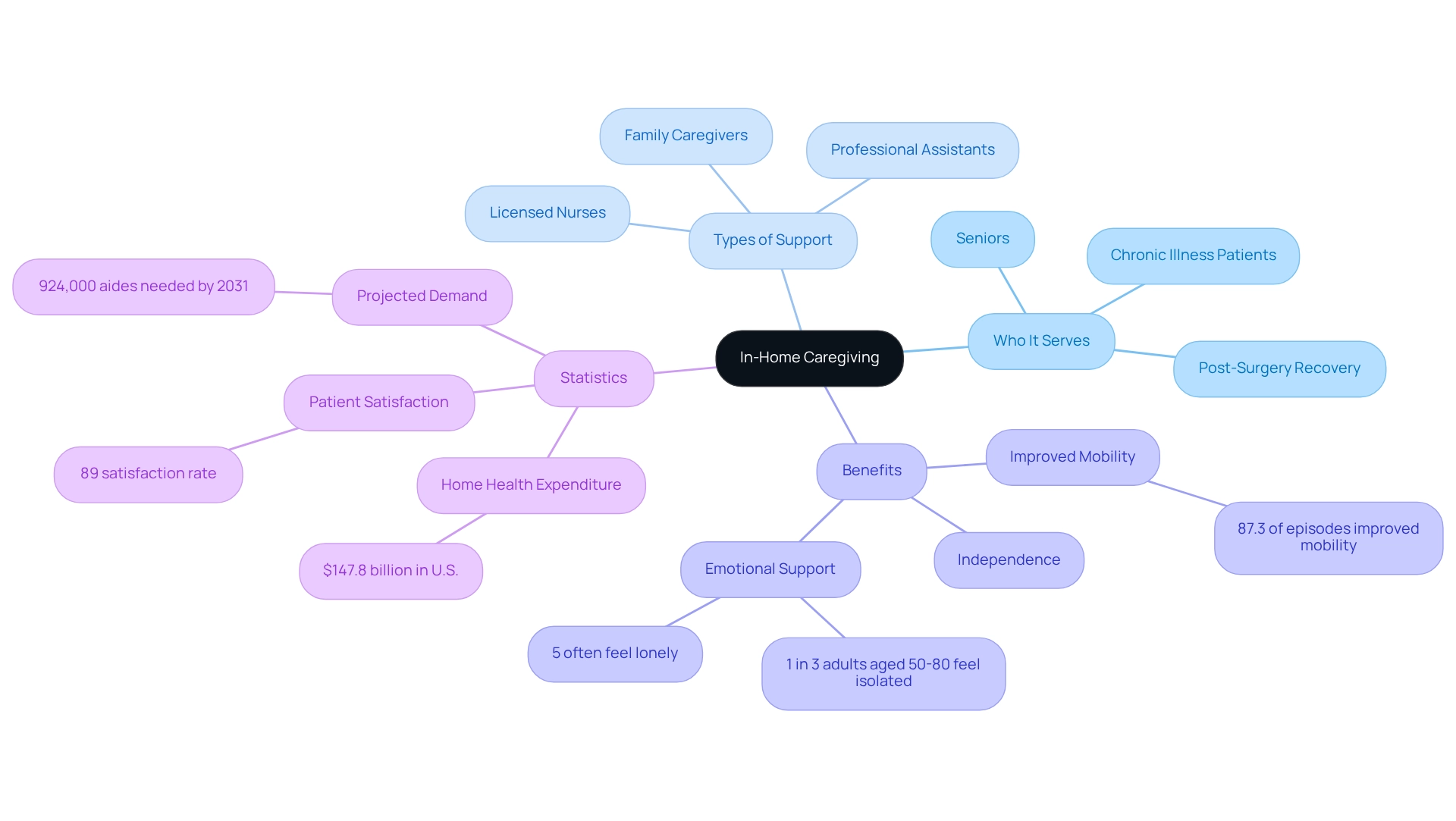
Types of In-Home Care Services: Tailoring Support to Individual Needs
In-home caregiving services encompass a range of vital support choices designed to address the varied requirements of seniors and their families. These offerings can be classified as follows:
- Personal Care: This includes assistance with daily activities such as bathing, dressing, grooming, and meal preparation. Our caregivers, referred by Best Care Nurses Registry, are carefully screened and committed to excellence, ensuring that seniors maintain their dignity and quality of life while thriving at home.
- Companionship: Companionship services focus on delivering social interaction and emotional support, which are vital for alleviating loneliness and improving mental well-being among older adults. These offerings are essential in reducing the dangers of isolation, ensuring that seniors feel connected and supported.
- Skilled Nursing Care: Provided by registered nurses, this form of care includes medical assistance such as medication management, wound treatment, and monitoring of chronic conditions. It ensures that seniors receive the necessary medical attention in the comfort of their homes, which is particularly important for those managing chronic conditions or recovering from surgeries.
- Physical Therapy: Rehabilitation support aimed at assisting seniors to restore mobility and strength after illness or injury fosters independence and enhances overall health. These offerings are crucial for sustaining an active lifestyle and avoiding additional health complications.
- Respite Support: This assistance provides temporary relief for primary caregivers, allowing them to take necessary breaks while ensuring that their loved ones continue to receive quality attention. Acknowledging the pressures faced by family supporters, Best Care Nurses Registry offers tailored solutions to reduce stress and guarantee safety for seniors.
Understanding these choices is essential for families aiming to select the most suitable options for their loved ones’ specific circumstances. Signs that indicate the necessity for CNA/HHA support include difficulty with personal hygiene, dressing, cooking, cleaning, or managing medications.
As we approach 2025, the landscape of in-home caregiving services continues to evolve, with a significant portion of seniors—41%—relying on these services to uphold their independence and quality of life.
The average caregiver is now 63 years old, highlighting the urgent need for personalized and adaptable care solutions. The economic impact of providing care is substantial, with relatives offering services valued at around $306 billion each year, emphasizing the necessity of acknowledging their contributions. Furthermore, many older individuals in supportive roles face increasing demands, as studies indicate that those caring for spouses often dedicate more hours to providing assistance.
By recognizing the various forms of in-home assistance available and the challenges faced by caregivers, families can make informed decisions that best support their loved ones’ needs. We’re here for you—call now to get started with Best Care Nurses Registry and schedule a call to discuss your needs.
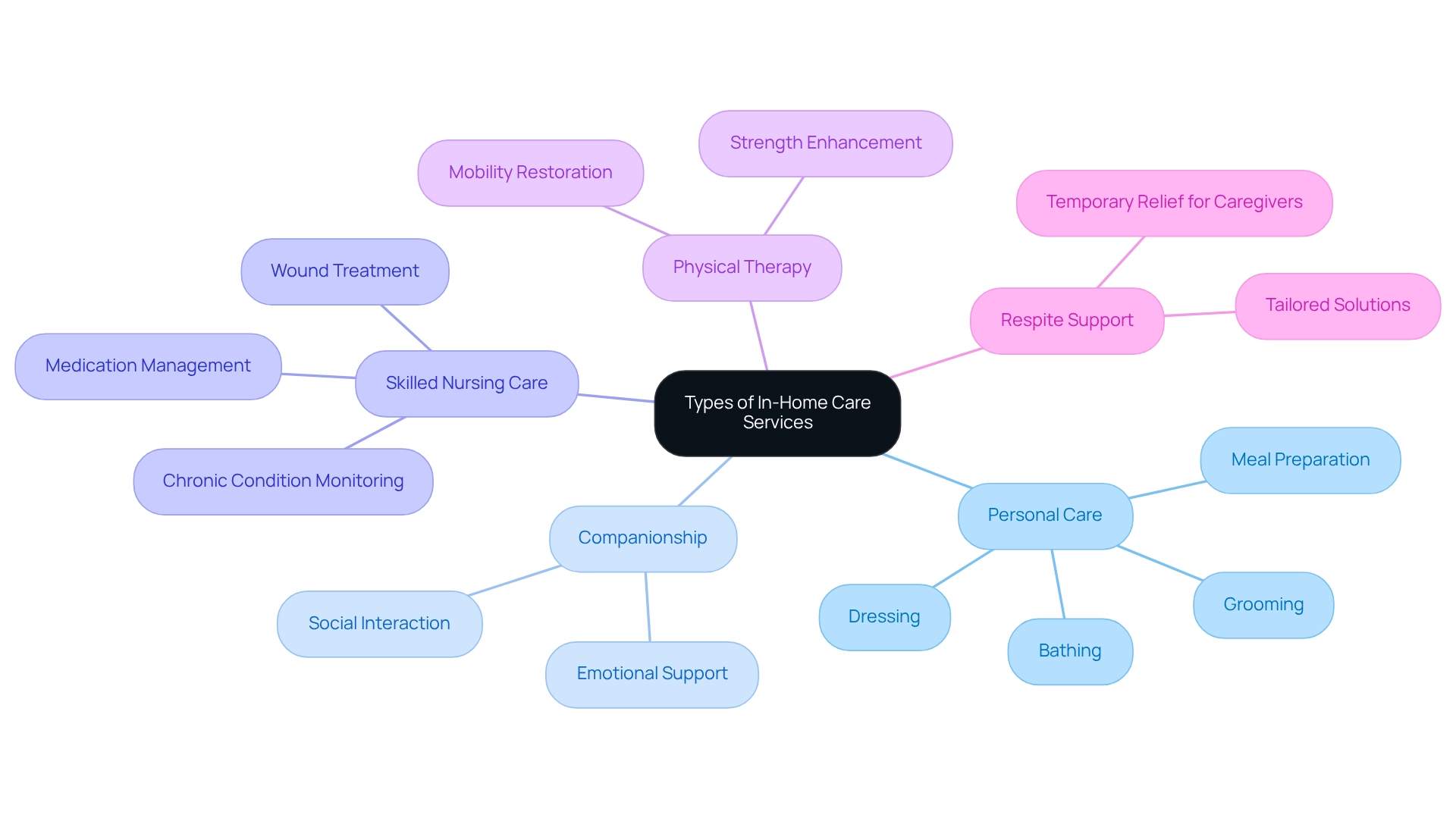
Funding In-Home Care: Navigating Long-Term Care Insurance and Other Options
Funding in-home care can feel overwhelming, but rest assured, there are several viable options available to help families manage costs effectively.
- Long-Term Support Insurance: Many policies are designed to cover in-home assistance services. However, it’s essential to carefully examine the details of each policy. Jesse Slome, director of the American Association for Long-Term Insurance, wisely notes, “Your money covers long-term insurance, but it’s your health that truly purchases it.” With nearly half of applicants over age 70 being denied coverage, obtaining insurance early and ensuring it aligns with personal health needs is crucial. Best Care Nurses Registry is here to assist clients in navigating these policies regarding in-home caregiving services, ensuring they understand their options.
- Medicaid provides significant assistance for those who qualify, covering various in-home caregiving services, including personal support and skilled nursing. Recent statistics reveal that Medicaid covers around 60% of long-term support expenses in the U.S., making it an essential resource for qualified individuals seeking in-home caregiving services.
- Veterans Benefits: Veterans may have access to specific programs that can help reduce home assistance costs. These benefits can include aid and attendance allowances, providing financial support for veterans who require assistance with daily living activities.
- Out-of-Pocket Payments: Many families opt to pay directly for services, offering greater flexibility in selecting assistance options. While this method may seem daunting, it allows households to tailor support to their loved ones’ unique needs without the constraints of insurance policies.
- State Support Initiatives: Numerous states have developed programs aimed at low-income seniors in need of in-home caregiving services. These programs can vary widely in terms of eligibility and benefits, so it’s advisable for families to research local resources to find the best fit for their situation.
Additionally, through the Best Care Concierge Program, clients gain access to a network of professionals, including financial advisors and legal experts, who can provide guidance on long-term care insurance and other financial matters. Best Care stands out due to its decades of experience, direct access to a Registered Nurse owner, and flexible caregiver replacement options. By exploring these funding avenues, families can alleviate some of the financial burdens associated with in-home caregiving services, ensuring that their loved ones receive the necessary support while maintaining their quality of life.
Furthermore, with home health aide costs rising by 3% in 2024 and homemaker services increasing by 10%, understanding these funding options is more critical than ever. The anticipated median yearly nursing home expense for a private room is expected to reach $255,463 by 2050, underscoring the importance of securing in-home assistance options early. Best Care Nurses Registry exemplifies a provider that offers individualized support, assisting families in navigating these financial considerations effectively.
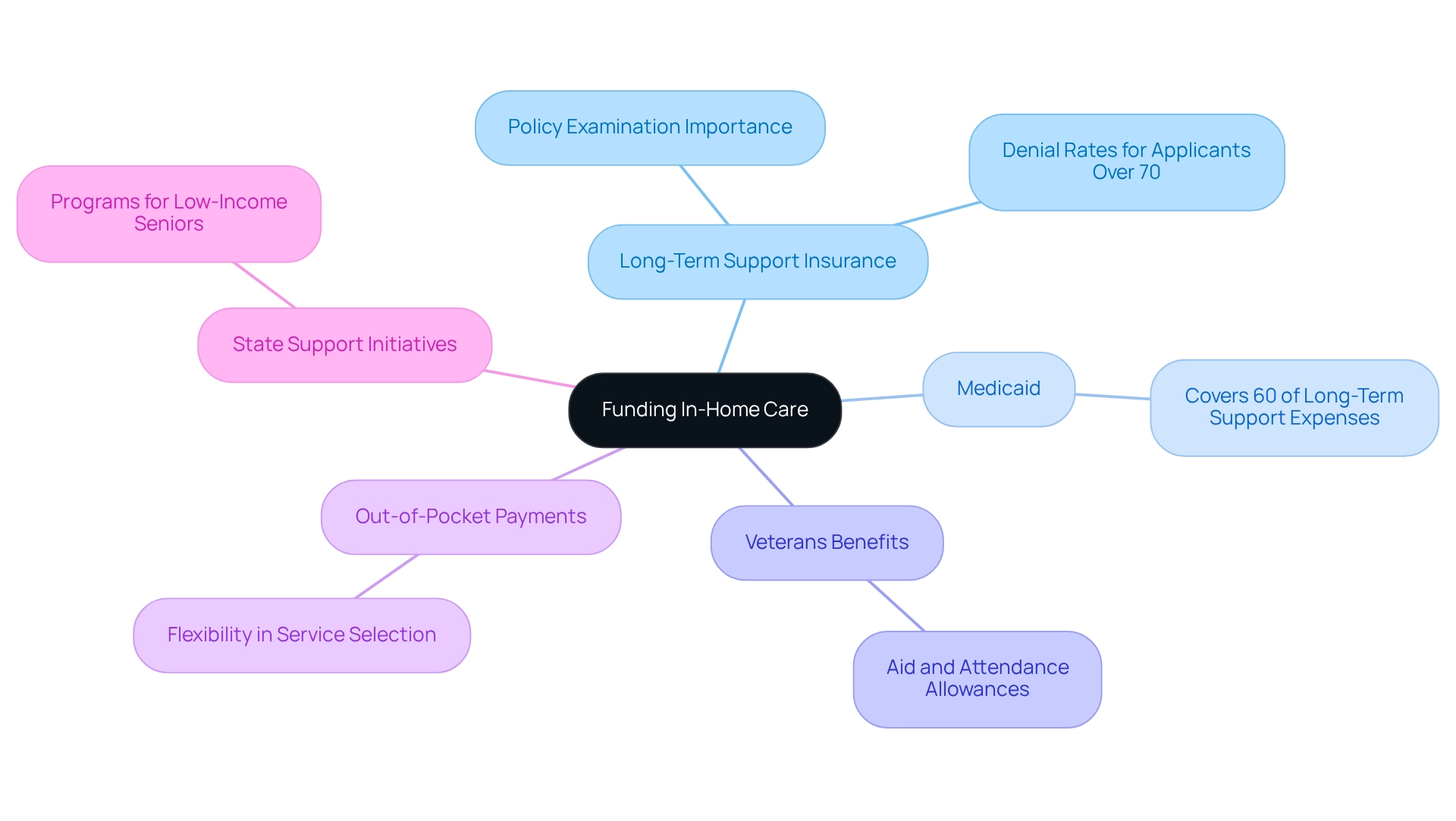
Creating Personalized Care Plans: Ensuring Quality of Life for Loved Ones
Developing a personalized support plan is essential for ensuring that seniors receive the tailored assistance they need through in-home caregiving services. This process involves several key steps that prioritize their well-being and comfort.
- Assessment: Start with a thorough evaluation of the individual’s physical, emotional, and social needs. This foundational step is vital for understanding the unique circumstances of each senior. Are they facing challenges with personal hygiene, dressing, cooking, cleaning, or managing medications? Health issues like chronic conditions, frequent hospital stays, or recent surgeries that require ongoing attention are also significant aspects to consider.
- Goal Setting: Establish clear and achievable goals that reflect the individual’s preferences and desired outcomes. Research shows that personalized support plans can enhance health-related quality of life. Studies demonstrate a significant effect size of 0.35 in self-management practices among participants, underscoring the effectiveness of customized approaches.
- Service Coordination: Identify the necessary services and coordinate with caregivers to ensure that all needs are met effectively. This includes considering various types of support, from companionship to skilled nursing, tailored to the individual’s situation. CNAs (Certified Nursing Assistants) typically undergo comprehensive training focused on medical duties, such as monitoring vital signs and administering medications, while HHAs (Home Health Aides) concentrate more on personal assistance and daily living tasks, such as bathing, grooming, meal preparation, and light housekeeping.
- Regular Review: Continuously monitor and adjust the support plan as the individual’s needs evolve. Regular evaluations are essential for adapting the support strategy to changing health conditions or personal preferences, ensuring ongoing relevance and effectiveness. Maintaining open communication with the provider and the home support agency is crucial for quality assistance. Regular check-ins and feedback mechanisms with caregivers can help address any issues promptly.
- Relative Participation: Involve relatives in the planning process to align the support plan with the individual’s lifestyle and values. Data from patient surveys emphasizes that the involvement of relatives is a vital resource in creating effective treatment plans, leading to improved communication and satisfaction with services. As one clinician noted, “relatives were a benefit to their diagnosis and treatment strategy,” highlighting the significance of their role.
By focusing on individualized support, relatives can greatly enhance their loved ones’ quality of life and foster independence. The incorporation of family perspectives not only enriches the planning process but also cultivates a supportive environment that honors the senior’s preferences and improves their overall well-being. Additionally, research involving lower socio-economic or minority groups has shown enhancements in certain outcome metrics, indicating the broader relevance and advantages of personalized treatment plans across diverse demographics.
Current studies continue to affirm the importance of involving patients in their treatment, emphasizing the need for tailored strategies in in-home caregiving services. To begin evaluating support requirements, relatives should reach out to a home assistance agency that offers in-home caregiving services. Discussing their loved one’s circumstances and exploring available options is a compassionate first step towards ensuring the best care.
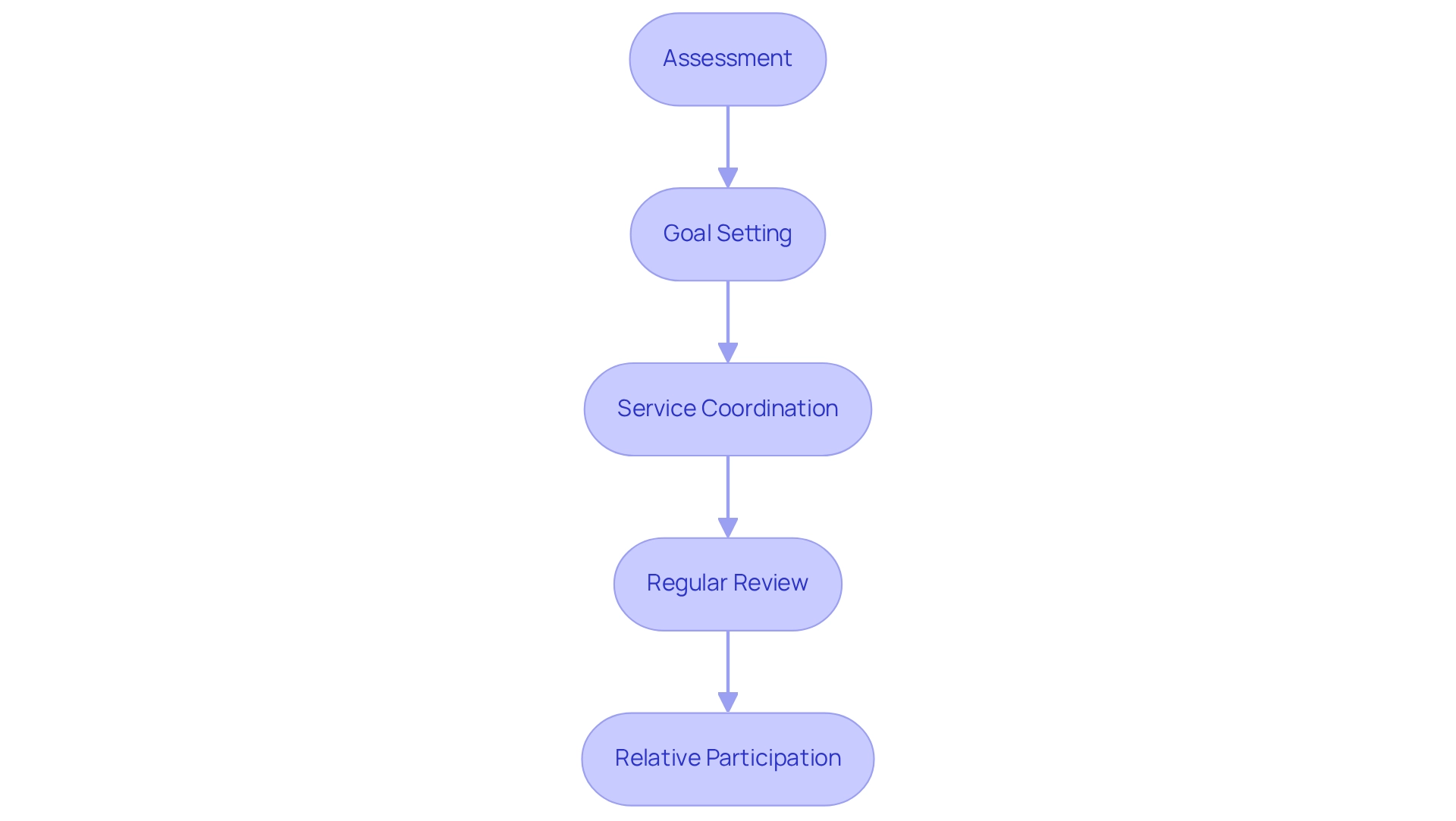
Overcoming Challenges in In-Home Care: Solutions for Common Family Concerns
Families often face various challenges when utilizing in-home caregiving services, which can profoundly affect the quality of assistance provided. Understanding these key issues is essential for creating a supportive environment.
- Communication Issues: Establishing clear communication between caregivers and family members is vital. Regular updates and transparent dialogue ensure that everyone is informed about the treatment plan and any changes in the client’s condition. Many families wonder how to determine if their elderly relative requires assistance at home, looking for signs like difficulties with daily tasks, memory issues, or emerging health concerns. A study highlights the importance of a clear display for home health information in electronic health record systems, which can significantly improve communication and service management.
- Provider Compatibility: Matching providers with clients based on personality traits and specific needs is crucial for fostering a positive relationship. Research indicates that compatibility can enhance service quality and increase satisfaction for both clients and their families. Best Care Nurses Registry operates in cities like Miami, Fort Lauderdale, and Boca Raton, where understanding local dynamics can further facilitate effective matching. Families are encouraged to consider the provider’s experience, qualifications, and reputation when selecting a personal aide.
- Managing Expectations: It is essential for families to set realistic expectations regarding the level of assistance and support available. Understanding the capabilities and limitations of caregivers helps align family needs with available options. The initial visit typically includes an assessment of your loved one’s needs, developing a support plan, and scheduling assistance.
- Financial Concerns: Regularly reviewing funding options and budgeting for care can help families avoid unexpected expenses. This proactive approach alleviates financial stress and ensures that necessary services remain accessible. Best Care Nurses Registry offers insurance assistance to help individuals navigate these financial considerations.
- Emotional Strain: The emotional impact of caregiving can be significant. Encouraging family members to seek help and explore respite services can aid in managing stress and preventing burnout, ultimately benefiting both caregivers and clients. Research sanctioned by the Institutional Review Board of Drexel University underscores the importance of organized support and supervision in in-home services, which can help mitigate emotional strain.
By proactively addressing these challenges, families can cultivate a more supportive and effective caregiving environment, enhancing the overall experience for everyone involved. Insights from the case study titled “Surveying Clinician Needs for Transition of Care Data” illustrate how effective communication and data management can improve care coordination and patient outcomes.
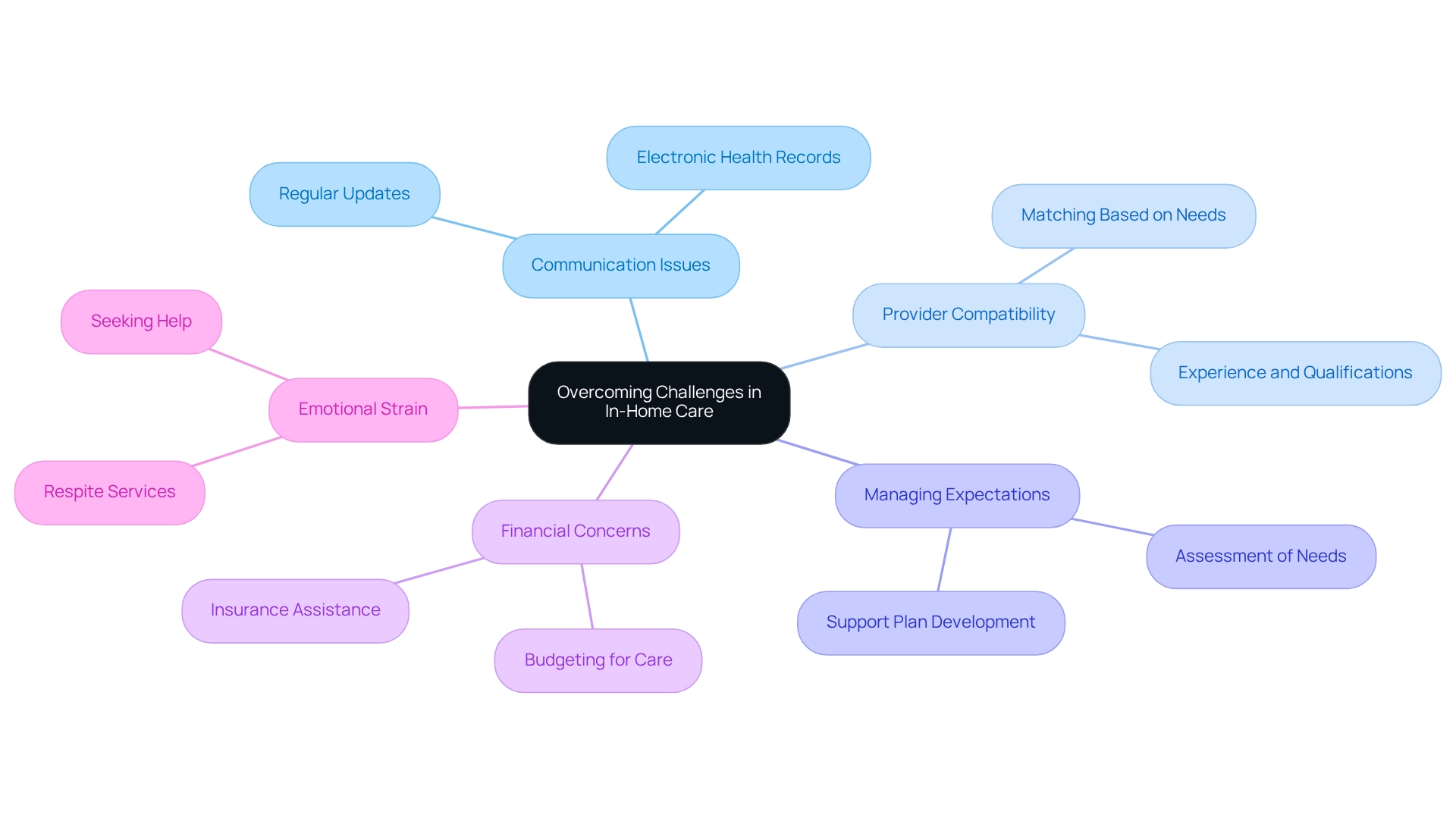
The Emotional Impact of In-Home Care: Supporting Families and Caregivers
The emotional impact of in-home caregiving can be profound for both caregivers and families, often manifesting in several significant ways:
- Stress and Anxiety: Caregivers frequently encounter elevated levels of stress due to the demanding nature of their responsibilities. According to The Guardian Life Insurance Company of America’s 12th Annual Workplace Benefits Study (2023), caregivers experience anxiety levels similar to those of individuals diagnosed with chronic illnesses, highlighting the toll caregiving can take on mental health.
- Remorse: Many relatives struggle with emotions of remorse, especially when they feel unable to offer all the essential support themselves. This emotional burden can lead to a cycle of self-blame, further exacerbating stress levels.
- Isolation: The intense demands of caregiving can lead to social isolation. Caregivers often find themselves distanced from friends and family, which can intensify feelings of loneliness and depression.
- Burnout: Prolonged caregiving without adequate support can culminate in burnout, characterized by emotional exhaustion and a diminished sense of personal accomplishment. This state not only affects the provider’s well-being but can also impact the quality of care given to the recipient.
- Emotional Resilience: To tackle these challenges, it is essential for those providing care to seek support through groups and counseling. Engaging with others who understand their experiences can foster emotional resilience and provide coping strategies. Experts emphasize that building a support network, including in-home caregiving services, is vital for maintaining mental health and preventing burnout. As Paula R. Sherwood, Assistant Professor of Nursing at the University of Pittsburgh, observes, “The prevailing conceptual model for caregiving assumes that the onset and progression of chronic illness and physical disability are stressful for both the patient and the individual providing care.”
While caregiving presents numerous challenges, it can also lead to personal growth and fulfillment. The case study titled “Positive Aspects of Caregiving” demonstrates that many individuals providing care report favorable experiences linked to caregiving, especially in the initial phases. This viewpoint emphasizes the possible advantages of caregiving, indicating that assisting others can improve the provider’s well-being and lower the chances of hospitalizations and mortality.
Moreover, the National Strategy to Assist Relatives in Care aims to enhance resources and assistance for relatives in care, highlighting the significance of community support in promoting emotional resilience.
Addressing these emotional aspects is essential for fostering a healthier caregiving environment. By ensuring that both providers and recipients receive the necessary support, households can enhance the overall caregiving experience, promoting well-being for all involved.
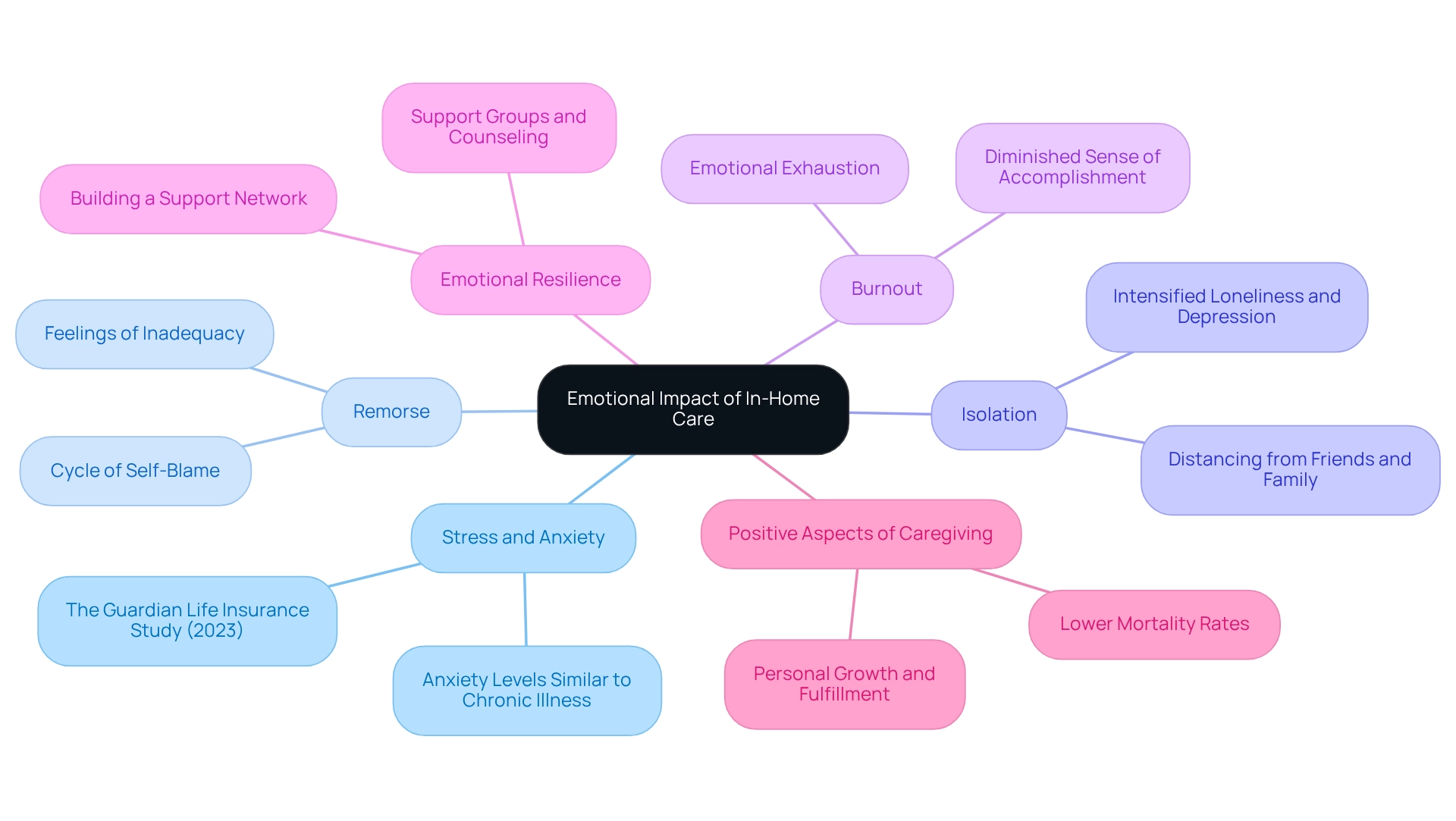
The Future of In-Home Caregiving: Trends and Innovations to Watch
The future of in-home caregiving is being shaped by several pivotal trends and innovations that aim to enhance the quality of care for your loved ones.
- Technology Integration: The rise of telehealth and remote monitoring technologies is transforming how service providers deliver assistance. These advancements not only improve the standard of in-home caregiving services but also facilitate continuous communication between caregivers and families. This ensures that your loved ones receive prompt support and attention. As Tauseef Riaz, cofounder of ConsidraCare, observes, “Although initial efforts at digitizing home support by firms like HomeHero were unsuccessful, new entities such as Honor, Papa, and Carelinx have been more effective at improving home assistance and efficiency through digital platforms.”
- Customized Support Solutions: There is a growing emphasis on creating personalized plans that meet the distinct requirements and preferences of each individual. This tailored approach not only improves patient satisfaction but also fosters a deeper connection between caregivers and clients, leading to better health outcomes. Best Care Nurses Registry exemplifies this commitment by providing flexible in-home caregiving services that cater to the specific requirements of clients, including pet-friendly assistance that ensures all family members are considered in the caregiving process.
- Rising Demand: With around 68 million individuals in the U.S. using a language other than English at home, the need for culturally skilled in-home support is growing. As the population ages, the demand for in-home caregiving services is expected to grow significantly. This highlights the need for diverse and inclusive caregiving solutions. Best Care’s emphasis on workforce diversity and inclusion positions it well to meet this challenge, fostering stronger relationships with clients and innovative approaches to support.
- Policy Changes: Legislative reforms are likely to influence funding and access to in-home care services. It’s important for families to stay informed about these changes to effectively navigate the evolving landscape and ensure they can secure the necessary in-home caregiving services for their loved ones.
- Community Support Programs: Many communities are acknowledging the significance of aiding those who provide care through dedicated initiatives that offer resources and assistance. These initiatives aim to alleviate the emotional and physical burdens of providing care, fostering a more sustainable environment for both providers and recipients. Additionally, specialized training and immigration reform are suggested solutions to address caregiver shortages, which is a critical issue in the industry.
By comprehending these trends, families can proactively arrange for the future of in-home caregiving services, ensuring that their loved ones receive the highest quality of support tailored to their specific needs. Best Care Nurses Registry provides a step-by-step guide to engaging with their services:
- Call (888) 203-2529 to speak with our friendly staff to discuss your needs and answer any questions you have.
- We’ll discuss your situation with you or your loved one and seek a care plan from your doctor that perfectly caters to your needs.
- We will refer compassionate caregivers whom you choose to work with. A brighter future for your loved one and your family is only a phone call away. CALL (888) 203-2529 to schedule a call.
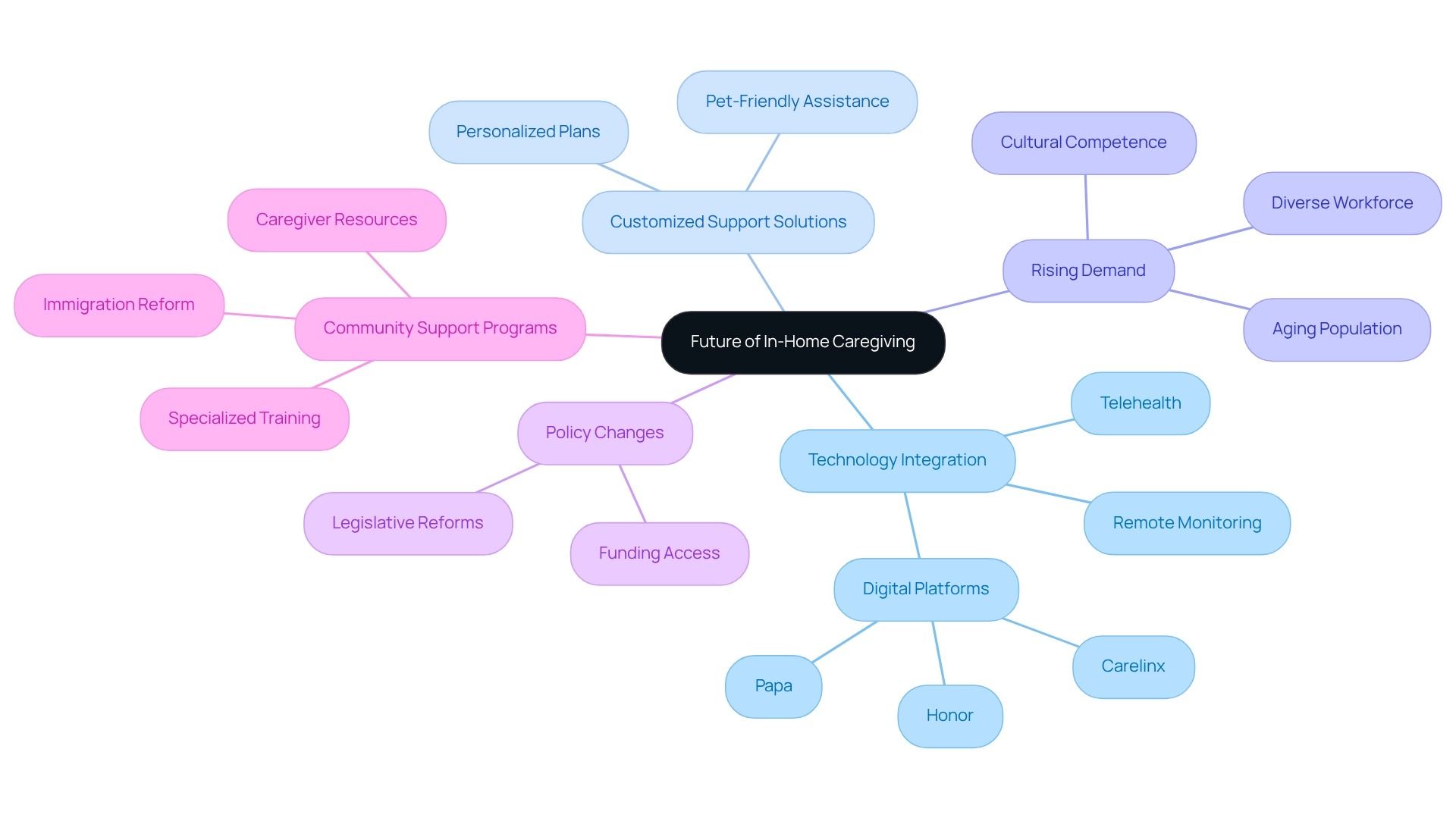
Conclusion
In-home caregiving stands as a vital approach to healthcare, providing essential support to individuals within the comfort of their own homes. This compassionate model not only addresses physical needs but also prioritizes emotional well-being and companionship. With a diverse array of services ranging from personal care to skilled nursing, in-home caregiving promotes independence and enriches the quality of life for seniors and those on the path to recovery.
Understanding the financial aspects of in-home care is crucial. Families can explore options like long-term care insurance, Medicaid, and veteran benefits to help manage costs effectively. Personalized care plans, tailored to individual preferences, ensure that clients receive the most suitable support.
The emotional impact on caregivers is significant, often leading to feelings of stress and isolation. Building support networks and seeking assistance can greatly alleviate these challenges. The future of in-home care shines brightly, fueled by technological advancements and an increasing demand for customized services.
In summary, in-home caregiving is a cornerstone of compassionate healthcare, offering both physical and emotional support. By prioritizing personalized care and utilizing available resources, families can ensure their loved ones thrive in nurturing environments, ultimately enhancing their quality of life. Remember, we’re here for you, and your comfort is our priority as we navigate this journey together.
Frequently Asked Questions
What are in-home caregiving services?
In-home caregiving services include a variety of options designed to assist individuals within their homes, focusing on daily tasks and medical needs. They are particularly beneficial for seniors, those with chronic illnesses, and individuals recovering from surgery.
Who provides in-home caregiving services?
Support can come from family members, professional assistants, and licensed nurses, including Certified Nursing Assistants (CNA) and Home Health Aides (HHA), who play crucial roles in ensuring the comfort and safety of those receiving assistance.
How does Best Care Nurses Registry approach in-home caregiving?
Best Care Nurses Registry offers personalized home health support services tailored to meet the unique needs of each individual. The process begins with a call to discuss needs and collaboration with healthcare providers to create a suitable treatment plan.
What types of services are included in in-home caregiving?
In-home caregiving services include personal care (assistance with daily activities), companionship (social interaction and emotional support), skilled nursing care (medical assistance), physical therapy (rehabilitation support), and respite support (temporary relief for primary caregivers).
How do in-home caregiving services impact the quality of life for seniors?
In-home caregiving services significantly enhance the quality of life for seniors by promoting independence, improving mobility, providing emotional support, and alleviating the burden on family members, allowing them to focus on their personal lives.
What are the statistics regarding in-home caregiving services?
Studies indicate that 87.3% of home health episodes resulted in improved mobility for patients, and 89% of patients express satisfaction with home healthcare options. Additionally, 41% of seniors rely on in-home caregiving services to maintain their independence.
What is the expected demand for home health assistants in the coming years?
There is an expected need for 924,000 personal support aides and home health aides from 2021 to 2031, reflecting the increasing recognition of the importance of at-home support.
How does Best Care Nurses Registry support families with payment options?
Best Care Nurses Registry provides guidance with payment options and long-term insurance claims to simplify the process for families seeking in-home caregiving services.
What signs indicate the need for CNA/HHA support?
Signs that indicate the necessity for CNA/HHA support include difficulty with personal hygiene, dressing, cooking, cleaning, or managing medications.
How long has Best Care Nurses Registry been in operation?
Best Care Nurses Registry has been dedicated to improving the quality of life for seniors and individuals with chronic illnesses since 1980.











